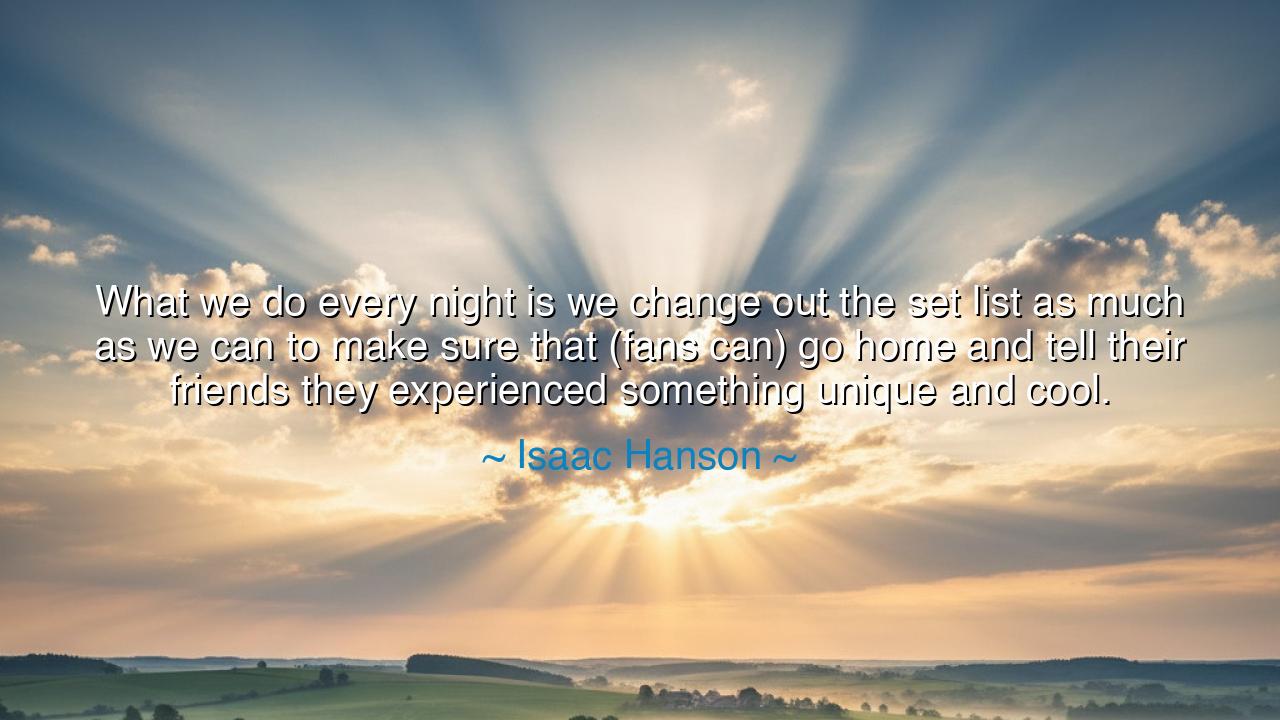
What we do every night is we change out the set list as much as
What we do every night is we change out the set list as much as we can to make sure that (fans can) go home and tell their friends they experienced something unique and cool.






In the heart of every performance, there lies a deep desire to offer something more than just the expected, to provide the audience with a unique experience that lingers long after the final note fades away. Isaac Hanson's words, "What we do every night is we change out the set list as much as we can to make sure that (fans can) go home and tell their friends they experienced something unique and cool," reveal a powerful philosophy about the artistry of live performance. It speaks not only to the musician’s craft but to the deeper human connection forged through shared experiences that break the confines of the ordinary. The act of altering the set list symbolizes a commitment to keeping the experience fresh, ensuring that each moment shared between the artist and audience is as authentic and memorable as possible.
This desire for uniqueness is an ancient and noble pursuit, found in the stories of heroes and artists throughout history. The Greek poets who recited their verses in the great amphitheaters understood that their art must stir the hearts of their listeners with every performance, for the same story told repeatedly could become stale. Homer, through his epic tales, sought to provide a new vision of heroism, each retelling offering depth and complexity that spoke to the unique moment in time. In the same way, Hanson’s effort to adapt the set list every night speaks to an ancient truth: art is not just about the repetition of a form, but about its ability to reflect and respond to the spirit of the moment, leaving the audience with a sense of connection and wonder.
The ancient Greek theater was a space of ritual and reflection, where the same tragedies could be performed night after night, yet each performance was understood to be an act of renewal—a reflection of both the eternal and the transient. The actors and playwrights, like Isaac Hanson and his band, understood that their role was not merely to repeat, but to make each act feel as if it were happening for the first time. In this way, the audience’s experience was always alive, and every night became an opportunity to create something memorable together. Just as Hanson changes the set list to ensure the experience remains dynamic and exciting, so too did the ancient actors bring new energy to their performances.
Shakespeare, in his time, understood this deeply. His plays, though often written and set in fixed structures, were also alive on the stage, and each performance was an opportunity for the actors to bring something new—a different emphasis, a different emotion, a different interpretation. The audience would leave feeling that they had witnessed not merely a performance but a moment—one that was unique to that night. In this way, Isaac Hanson’s approach to the set list echoes the same wisdom: by constantly adapting, they ensure that their fans are not just passive observers, but participants in an ever-evolving experience, an experience that belongs to them as much as it does to the performers.
What we learn from Hanson’s words is the value of constant reinvention in our own lives, whether in our careers, our relationships, or our creative endeavors. Routine is the enemy of meaningful engagement, for it often leads to stagnation and complacency. The wisdom here is not simply in changing the set list but in recognizing that innovation—the willingness to evolve, to adapt, and to respond to the world as it is in that moment—breathes life into everything we do. It is in embracing this fluidity that we maintain our connection to the world around us, ensuring that every moment we share, whether on stage or in life, is filled with relevance and vibrancy.
In our own lives, the lesson is clear: greatness is found not in simply doing the same thing over and over, but in reimagining and redefining our actions to make them meaningful and impactful in the context of the present. Like Hanson with their set list, we must be willing to take risks, to change course, and to embrace the unknown in order to keep our journey exciting, purposeful, and alive. Whether it is in our personal growth, our work, or our relationships, we must strive to create moments that are unique—moments that leave a lasting impression and resonate deeply with ourselves and others.
The call to action here is one of intentionality and creativity. We are the artists of our own lives, and it is through our choices, our actions, and our willingness to embrace change that we give our lives depth and meaning. Just as the Hanson brothers provide their audience with something new and exhilarating every night, so too must we approach life with a sense of adventure and innovation, ensuring that each day we live is one that leaves us with something unforgettable, something that can be shared, remembered, and cherished.






AAdministratorAdministrator
Welcome, honored guests. Please leave a comment, we will respond soon